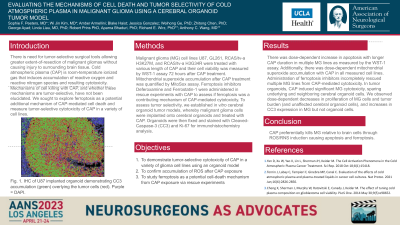Evaluating the Mechanisms of Cell Death and Tumor Selectivity of Cold Atmospheric Plasma in Malignant Glioma Using a Cerebral Organoid Tumor Model
Friday, April 21, 2023

.jpeg.jpg)
Sophie Peeters, MD
Resident
University of California, Los Angeles
Los Angeles, California, United States
ePoster Presenter(s)
Introduction: There is need for tumor-selective surgical tools allowing greater extent-of-resection of malignant gliomas without causing injury to surrounding brain tissue. Cold atmospheric plasma (CAP) is room-temperature ionized gas that induces accumulation of reactive oxygen and reactive nitrogen species and resulting cytotoxicity. Mechanisms of cell killing with CAP, and whether these mechanisms are tumor-selective, have not been elucidated. We sought to explore ferroptosis as a potential additional mechanism of CAP-mediated cell death and measure tumor-selective cytotoxicity of CAP in a variety of cell lines.
Methods: Malignant glioma (MG) cell lines U87, GL261, RCAS/tv-a H3K27M, and RCAS/tv-a H3G34R were treated with various length of CAP and their cell viability was measured by WST-1 assay 72 hours after CAP treatment. Mitochondrial superoxide accumulation after CAP treatment was quantified by MitoSox assay. Ferroptosis inhibitors Deferoxamine and Ferrostatin-1 were administered in rescue experiments with CAP to assess if ferroptosis was a contributing mechanism of CAP-mediated cytotoxicity. To assess tumor selectivity, we established in vitro cerebral organoid tumor models, whereby malignant glioma cells were implanted onto cerebral organoids and treated with CAP. Organoids were then fixed and stained with Cleaved-Caspase-3 (CC3) and Ki-67 for immunohistochemistry analysis.
Results: There was dose-dependent increase in apoptosis with longer CAP duration in multiple MG lines as measured by the WST-1 assay. Additionally, there was dose-dependent mitochondrial superoxide accumulation with CAP in all measured cell lines. Administration of ferroptosis inhibitors incompletely rescued multiple MG lines from CAP-mediated cytotoxicity. In tumor organoids, CAP induced significant MG cytotoxicity, sparing underlying and neighboring cerebral organoid cells. We observed dose-dependent decreases in proliferation of MG cells and tumor burden (and unaffected cerebral organoid cells), and increases in CC3 expression in MG but not organoid cells.
Conclusion : CAP preferentially kills MG relative to brain cells through ROS/RNS induction causing apoptosis and ferroptosis.
Methods: Malignant glioma (MG) cell lines U87, GL261, RCAS/tv-a H3K27M, and RCAS/tv-a H3G34R were treated with various length of CAP and their cell viability was measured by WST-1 assay 72 hours after CAP treatment. Mitochondrial superoxide accumulation after CAP treatment was quantified by MitoSox assay. Ferroptosis inhibitors Deferoxamine and Ferrostatin-1 were administered in rescue experiments with CAP to assess if ferroptosis was a contributing mechanism of CAP-mediated cytotoxicity. To assess tumor selectivity, we established in vitro cerebral organoid tumor models, whereby malignant glioma cells were implanted onto cerebral organoids and treated with CAP. Organoids were then fixed and stained with Cleaved-Caspase-3 (CC3) and Ki-67 for immunohistochemistry analysis.
Results: There was dose-dependent increase in apoptosis with longer CAP duration in multiple MG lines as measured by the WST-1 assay. Additionally, there was dose-dependent mitochondrial superoxide accumulation with CAP in all measured cell lines. Administration of ferroptosis inhibitors incompletely rescued multiple MG lines from CAP-mediated cytotoxicity. In tumor organoids, CAP induced significant MG cytotoxicity, sparing underlying and neighboring cerebral organoid cells. We observed dose-dependent decreases in proliferation of MG cells and tumor burden (and unaffected cerebral organoid cells), and increases in CC3 expression in MG but not organoid cells.
Conclusion : CAP preferentially kills MG relative to brain cells through ROS/RNS induction causing apoptosis and ferroptosis.
